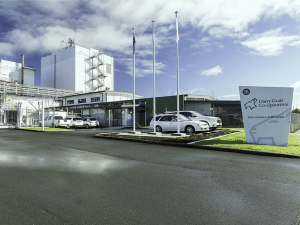Dairy goat farmers hopeful co-op will turn a corner
Farmer owners of the Dairy Goat Co-operative (DGC) in Hamilton say they believe in the business’s long-term future.
 There was backlash from farmer shareholders earlier this year after DGC asked suppliers to reduce their milk supply by one-third for the coming season.
There was backlash from farmer shareholders earlier this year after DGC asked suppliers to reduce their milk supply by one-third for the coming season.
There have been leadership changes at the Hamilton-based Dairy Goat Co-operative, which has been struggling financially in recent years.
Chief executive David Hemara left the co-op a month ago. Shareholders have been told that chair Campbell Storey will step down from the role at DCG's annual meeting in September.
Former chief executive Tony Giles has been appointed as acting CEO.
There was backlash from farmer shareholders earlier this year after DGC asked suppliers to reduce their milk supply by one-third for the coming season.
In March, Hemara told Rural News that DGC has advised its shareholder suppliers that it will call for less milk in the 2024/24 season than shareholders would normally expect to supply.
“While the final amount of milk per shareholder is yet to be finalised, we have advised shareholders that we expect that they will be asked to reduce supply to around two-thirds of normal level.
“This reduction is necessary to better balance incoming milk against forecast product sales for 2024/25. This is a continuation of a cap that we have applied for several seasons and reflects changing demand levels in some markets since Covid.”
Hemara said that the global supply/demand situation for goat milk has been impacted by four key factors; Declining birth rates internationally, sales channels that have changed during covid – including the Daigou informal sales channel to China and cost of living pressure in many economies. There has also been a structural change in the China consumer market where over the last four years China consumers have moved strongly to support Chinese domestic brands. This same impact has occurred in the infant formula segment, he added.
“At present, our view is that there is more goat milk than demand globally. We recognise that this balance can and does change over time and we have historically experienced periods of oversupply and under supply of milk.”
European dairy giant Arla Foods celebrated its 25th anniversary as a cross-border, farmer-owned co-operative with a solid half-year result.
The sale of Fonterra’s global consumer and related businesses is expected to be completed within two months.
Fonterra is boosting its butter production capacity to meet growing demand.
For the most part, dairy farmers in the Waikato, Bay of Plenty, Tairawhiti and the Manawatu appear to have not been too badly affected by recent storms across the upper North Island.
South Island dairy production is up on last year despite an unusually wet, dull and stormy summer, says DairyNZ lower South Island regional manager Jared Stockman.
Following a side-by-side rolling into a gully, Safer Farms has issued a new Safety Alert.